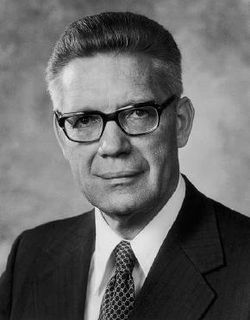A Quote by Jacob Bronowski
Whether our work is art or science or the daily work of society, it is only the form in which we explore our experience which is different.
Related Quotes
What strikes me is the fact that in our society, art has become something which is related only to objects and not to individuals, or to life. That art is something which is specialized or which is done by experts who are artists. But couldn't everyone's life become a work of art? Why should the lamp or the house be an art object, but not our life?
During my span of life science has become a matter of public concern and the l'art pour l'art standpoint of my youth is now obsolete. Science has become an integral and most important part of our civilization, and scientific work means contributing to its development. Science in our technical age has social, economic, and political functions, and however remote one's own work is from technical application it is a link in the chain of actions and decisions which determine the fate of the human race. I realized this aspect of science in its full impact only after Hiroshima.
The private motives of scientists are not the trend of science. The trend of science is made by the needs of society: navigation before the eighteenth century, manufacture thereafter; and in our age I believe the liberation of personality. Whatever the part which scientists like to act, or for that matter which painters like to dress, science shares the aims of our society just as art does.
We must ask whether our machine technology makes us proof against all those destructive forces which plagued Roman society and ultimately wrecked Roman civilization. Our reliance - an almost religious reliance - upon the power of science and technology to forever ensure the progress of our society, might blind us to some very real problems which cannot be solved by science and technology.
The only kind of work which permits an able woman to realize her abilities fully, to achieve identity in society in a life plan that can encompass marriage and motherhood, is the kind that was forbidden by the feminine mystique, the lifelong commitment to an art or science, to politics or profession. If divorce has increased by one thousand percent, don't blame the women's movement. Blame the obsolete sex roles on which our marriages were based.
Industrial Society is not merely one containing 'industry,' large-scale productive units capable of supplying man's material needs in a way which can eliminate poverty: it is also a society in which knowledge plays a part wholly different from that which it played in earlier social forms, and which indeed possesses a quite different type of knowledge. Modern science is inconceivable outside an industrial society: but modern industrial society is equally inconceivable without modern science. Roughly, science is the mode of cognition of industrial society, and industry is the ecology of science.
At present, when the prevailing forms of society have become hindrances to the free expression of human powers, it is precisely the abstract branches of science, mathematics and theoretical physics, which ... offer a less distorted form of knowledge than other branches of science which are interwoven with the pattern of daily life, and the practicality of which seemingly testifies to their realistic character.
Therefore, the two processes, that of science and that of art, are not very different. Both science and art form in the course of the centuries a human language by which we can speak about the more remote parts of reality, and the coherent sets of concepts as well as the different styles of art are different words or groups of words in this language.
Faith and daily life, faith and work-these are not separate things. They are one and the same. To think of them as separate-that faith is faith, and work is work-is theoretical faith. Based on the recognition that work and faith are one and the same, we should put one hundred percent of our energy into our jobs and one hundred percent into our faith, too. When we resolve to do this, we enter the path of victory in life. Faith means to show irrefutable proof of victory amid the realities of society and in our own daily lives.
There are always forces at work in a society, certainly in America, which are really forces of censorship -either religious bodies or zealots who are always putting pressure on things, whether it's books or art or film. And all art is fundamentally subversive, because it upsets people's perceptions, their notions about society. Therefore, art is dangerous, but good art is always making us reassess our thoughts and feelings about how we relate to other people. There are always people who fear that and want to suppress that.
We are here on earth to work-to work long, hard, arduous hours, to work until our backs ache and our tired muscles knot, to work all our days. This mortal probation is one in which we are to eat our bread in the sweat of our faces until we return to the dust from whence we came. Work is the law of life; it is the ruling principle in the lives of the Saints.




































